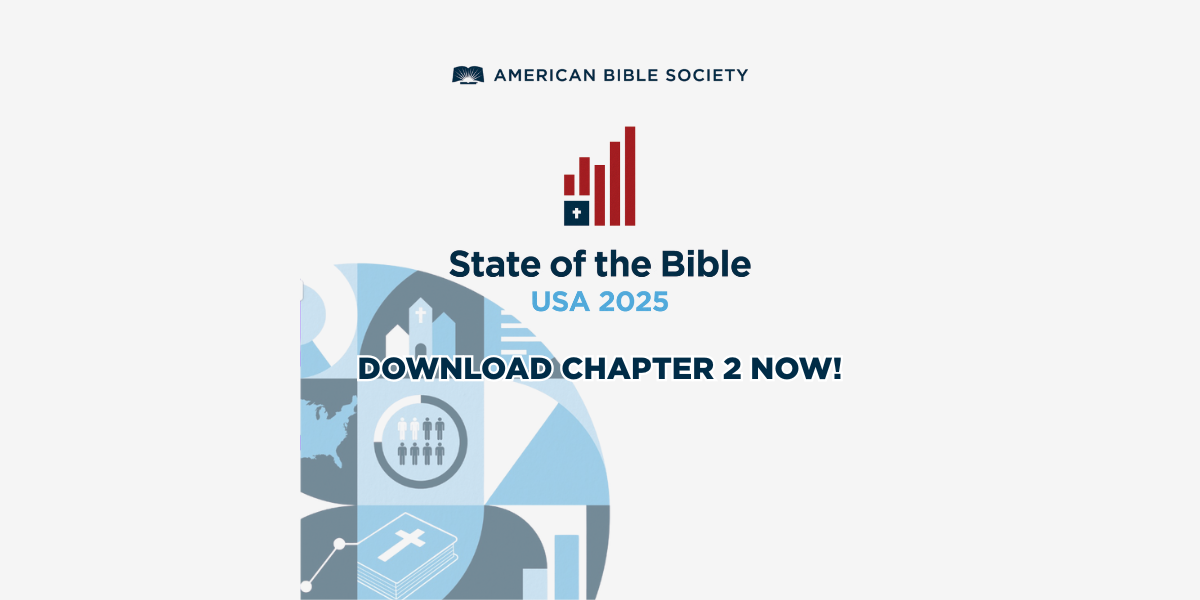American Bible Society today released the second chapter of their 15th annual State of the Bible report, which offers a global perspective on Bible engagement with a particular focus on “the Secular West” cluster: the USA, Canada, Western Europe, Australia, and New Zealand. The latest findings delve into how Americans’ attitudes about the Bible, faith and the church compare to those around the world. The second chapter of State of the Bible: USA 2025 is now available for download at StateoftheBible.org.
American Bible Society is a member of United Bible Societies (UBS), a fellowship active in more than 240 nations around the world. In partnership with the British and Foreign Bible Society, UBS, and Gallup, the Patmos World Bible Attitudes Survey polled 91,000 people in 85 countries regarding Bible attitudes and practices. This survey identifies seven “clusters” of countries, with each cluster representing distinct characteristics and challenges regarding the Bible and Christian faith.
“These insights, made possible by invaluable contributions and expertise among our partner organizations, give us an unprecedented view of worldwide attitudes toward and engagement with the Bible,” stated John Farquhar Plake, Chief Innovation Officer at American Bible Society and editor-in-chief of the State of the Bible series. “This study helps us see where God’s Word is spreading and his church is growing. We also see vast opportunities to share his Word with the world.”
Data in this chapter are taken by permission from The Patmos World Bible Attitudes Survey (2025). Gallup is the source research agency for The Patmos Survey, and fieldwork details for all countries can be found in the methodology chapter of The Patmos Survey report: patmos.bfbs.org.
Key findings analyzed in Chapter 2: The Bible Around the World
- Belief in the personal relevance of the Bible is low in countries belonging to the “Secular West” cluster, with only 37% of all residents agreeing that the Bible is personally relevant to them. The U.S. stands out, with more than half its population (51%) affirming Scripture’s relevance, compared to less than a quarter (24%) who disagree. However, the vast majority of countries in the “Secular West” are much more inclined to disagree than agree that the Bible is personally relevant.
- Across the “Secular West” cluster, only 40% of residents said religion is an important part of their daily life, compared to 69% of the global population. Among those who disagreed in “Secular West” countries, nearly one third (31%) said they don’t believe in any divine beings or higher powers, and one fifth (20%) said that they did not view religion as relevant to their life. Only 6% said they have had a negative experience with religion.
- Globally, a significant portion of Christians (42%), engage with the Bible at least weekly. Still, one in five Christians (20%), report never using it. There’s widespread agreement worldwide (70%, or 7 in 10 people) that familiarity with Bible stories is beneficial for children.
- In Asia, a significant majority of the population (76%) report having no knowledge of the Bible. Over half of respondents (56%) say they have never even heard of the Bible, signaling a key opportunity for growth in terms of global Bible awareness.
- Around the world, 35% of people are interested in learning more about the Bible.
Among those in the “Secular West” who expressed interest, the top four reasons were:- 1) “To help me grow spiritually” (19%)
- 2) “To help me know God better” (16%)
- 3) “To help me answer life’s big questions” (15%)
- 4) “To help me understand what Christians believe” (13%)
Continuing monthly through December 2025, American Bible Society will release seven additional chapters in the State of the Bible story, including findings regarding trust, flourishing, identity, and church and Bible engagement.
To download the second chapter of State of the Bible 2025, visit StateoftheBible.org.





